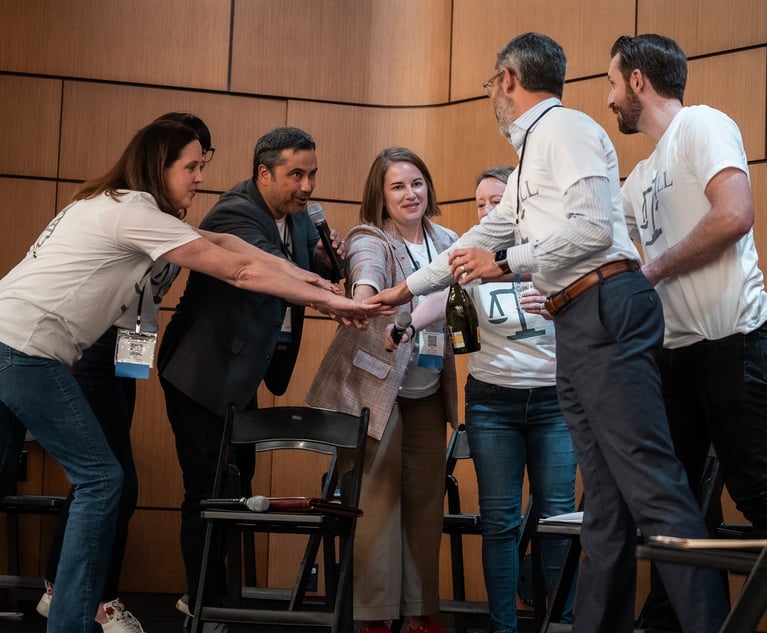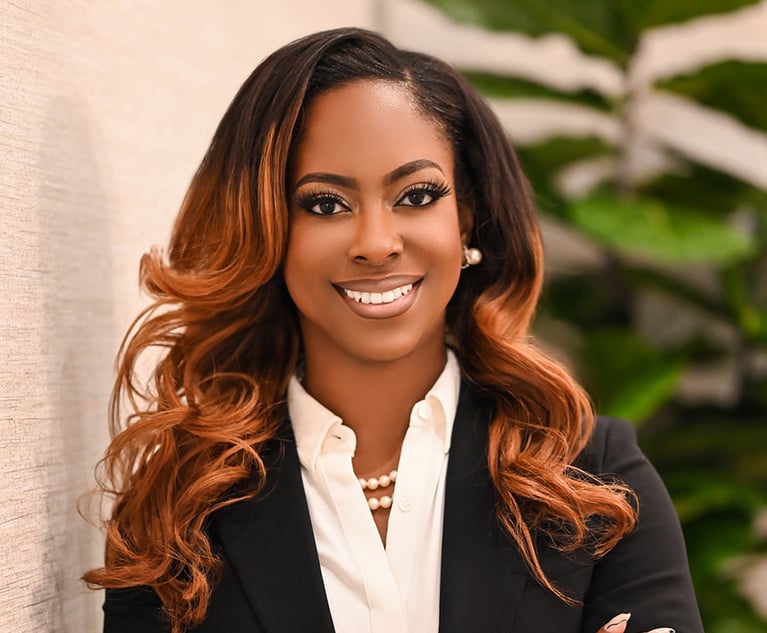Justice Sonia Sotomayor Charms Crowd of Law Students, Lawyers, Judges
The Supreme Court justice spoke at the University of Houston Law Center, commenting on legal education, the quality of lawyers who argue before the Supreme Court and the intersection of politics and the law.
January 26, 2018 at 06:16 PM
4 minute read
 University of Houston Law Center professor Michael Olivas and U.S. Supreme Court Justice Sonia Sotomayor.
University of Houston Law Center professor Michael Olivas and U.S. Supreme Court Justice Sonia Sotomayor.
U.S. Supreme Court Justice Sonia Sotomayor said she strives to stay away from politics, but the justice worked the room like a politician while speaking on Friday to law students, lawyers and judges at the University of Houston Law Center.
During an hour-long talk and question-and-answer session, Sotomayor offered her thoughts on what is needed in a legal education, the quality of lawyers who argue before the Supreme Court and the intersection of politics and the law.
For the first half hour, Sotomayor sat on a stage and answered questions posed by UH Law Center professor Michael Olivas, who is a friend of Sotomayor. During the next 30 minutes, she walked through Max Krost Hall and answered questions from law students while simultaneously shaking hands with audience members and posing for photos with the law students who had questions for her.
She said walking around helps her think.
Sotomayor, who graduated from Yale Law School in 1979 and joined the court in 2009, has her own specific ideas for improving legal education. She said law schools should start ethics training for law students earlier and should require students to do pro bono work while in law school—something some law schools are doing well by establishing legal clinics.
She also said law schools should emphasize core courses, such as tax, corporate and trusts and estates, to develop well-rounded lawyers. These classes help make sure lawyers “can figure out any situation,” she said.
One law student asked the justice what she does when her personal experiences intersect with an issue in a case before the court. Sotomayor said that justices have to take stock of their own prejudices so they can be fair to both sides. But she noted that “the fact that I'm sympathetic does not mean the law is.”
Sotomayor also shared her observation that sometimes criminal defense attorneys making oral arguments before the court for the first time don't do as well as veteran appellate lawyers who know how to present a U.S. Supreme Court argument. And she was unusually candid about how she responds to them. When a “new advocate” comes before the court, Sotomayor said she may pass a note to a colleague, saying, “I want to kill them,” because that lawyer may miss a line of argument or take an unnecessary position.
When a student asked her how the court maintains judicial integrity in times of political pressure, Sotomayor responded, “It's not easy”—a comment that drew a big laugh.
Sotomayor said the court seems to be taking more cases on issues that should be before the legislative branch, but added that the justices nevertheless strive to follow the Constitution.
“Each of us works very hard to ensure we don't get caught up in the fray,” she said.
She said the justices make their opinions on hot-button issues known in their dissents and concurrences, but few people actually read those opinions.
At a time when women's rights and the #MeToo movement have dominated national discourse, Sotomayor offered some insight to women law students. Conditions are “getting better,” she said, and the legal profession is improving pay and responsibilities for women lawyers.
But some changes that are less clear-cut yet nevertheless needed will take longer, she said. For example, she expressed hope that someday a U.S. marshal she sees at a courthouse may “think twice before calling me 'Honey.'”
The University of Houston Law Center extended an invitation to Sotomayor three years ago. Leonard Baynes, dean of the law school, said students benefit in a big way from meeting a Supreme Court Justice in person. It makes the court come alive for the students, as well as the cases they read in class.
“For law students, seeing a Supreme Court Justice is like seeing a rock star,” Baynes said.
Copies of Sotomayor's memoir, “My Beloved World,” were offered for sale outside Krost Hall. In 2013, Sotomayor visited Houston and gave a talk that was open to the public and hosted by a Houston speakers' organization.
This content has been archived. It is available through our partners, LexisNexis® and Bloomberg Law.
To view this content, please continue to their sites.
Not a Lexis Subscriber?
Subscribe Now
Not a Bloomberg Law Subscriber?
Subscribe Now
NOT FOR REPRINT
© 2025 ALM Global, LLC, All Rights Reserved. Request academic re-use from www.copyright.com. All other uses, submit a request to [email protected]. For more information visit Asset & Logo Licensing.
You Might Like
View All
Diversity Pros Hope Work Allocation Offers a Key to Building Inclusive Law Firms
5 minute read

Troutman Pepper, Davis Polk Cases Put Partners' Feedback for Associates Under the Microscope
6 minute read
Trending Stories
- 1Data Breach Lawsuit Against Byte Federal Among 1,500 Targeting Companies in 2024
- 2Counterfeiters Ride Surge in Tabletop Games’ Popularity, Challenging IP Owners to Keep Up
- 3Health Care Data Breach Class Actions Saw December Surge in NY Courts
- 4Florida Supreme Court Disbars 3, Suspends 11, Reprimands 1 in Final Disciplinary Order of 2024
- 5Chief Justice Roberts Ends Year With Defense Against 'Illegitimate' Attacks on Judiciary
Who Got The Work
Michael G. Bongiorno, Andrew Scott Dulberg and Elizabeth E. Driscoll from Wilmer Cutler Pickering Hale and Dorr have stepped in to represent Symbotic Inc., an A.I.-enabled technology platform that focuses on increasing supply chain efficiency, and other defendants in a pending shareholder derivative lawsuit. The case, filed Oct. 2 in Massachusetts District Court by the Brown Law Firm on behalf of Stephen Austen, accuses certain officers and directors of misleading investors in regard to Symbotic's potential for margin growth by failing to disclose that the company was not equipped to timely deploy its systems or manage expenses through project delays. The case, assigned to U.S. District Judge Nathaniel M. Gorton, is 1:24-cv-12522, Austen v. Cohen et al.
Who Got The Work
Edmund Polubinski and Marie Killmond of Davis Polk & Wardwell have entered appearances for data platform software development company MongoDB and other defendants in a pending shareholder derivative lawsuit. The action, filed Oct. 7 in New York Southern District Court by the Brown Law Firm, accuses the company's directors and/or officers of falsely expressing confidence in the company’s restructuring of its sales incentive plan and downplaying the severity of decreases in its upfront commitments. The case is 1:24-cv-07594, Roy v. Ittycheria et al.
Who Got The Work
Amy O. Bruchs and Kurt F. Ellison of Michael Best & Friedrich have entered appearances for Epic Systems Corp. in a pending employment discrimination lawsuit. The suit was filed Sept. 7 in Wisconsin Western District Court by Levine Eisberner LLC and Siri & Glimstad on behalf of a project manager who claims that he was wrongfully terminated after applying for a religious exemption to the defendant's COVID-19 vaccine mandate. The case, assigned to U.S. Magistrate Judge Anita Marie Boor, is 3:24-cv-00630, Secker, Nathan v. Epic Systems Corporation.
Who Got The Work
David X. Sullivan, Thomas J. Finn and Gregory A. Hall from McCarter & English have entered appearances for Sunrun Installation Services in a pending civil rights lawsuit. The complaint was filed Sept. 4 in Connecticut District Court by attorney Robert M. Berke on behalf of former employee George Edward Steins, who was arrested and charged with employing an unregistered home improvement salesperson. The complaint alleges that had Sunrun informed the Connecticut Department of Consumer Protection that the plaintiff's employment had ended in 2017 and that he no longer held Sunrun's home improvement contractor license, he would not have been hit with charges, which were dismissed in May 2024. The case, assigned to U.S. District Judge Jeffrey A. Meyer, is 3:24-cv-01423, Steins v. Sunrun, Inc. et al.
Who Got The Work
Greenberg Traurig shareholder Joshua L. Raskin has entered an appearance for boohoo.com UK Ltd. in a pending patent infringement lawsuit. The suit, filed Sept. 3 in Texas Eastern District Court by Rozier Hardt McDonough on behalf of Alto Dynamics, asserts five patents related to an online shopping platform. The case, assigned to U.S. District Judge Rodney Gilstrap, is 2:24-cv-00719, Alto Dynamics, LLC v. boohoo.com UK Limited.
Featured Firms
Law Offices of Gary Martin Hays & Associates, P.C.
(470) 294-1674
Law Offices of Mark E. Salomone
(857) 444-6468
Smith & Hassler
(713) 739-1250






